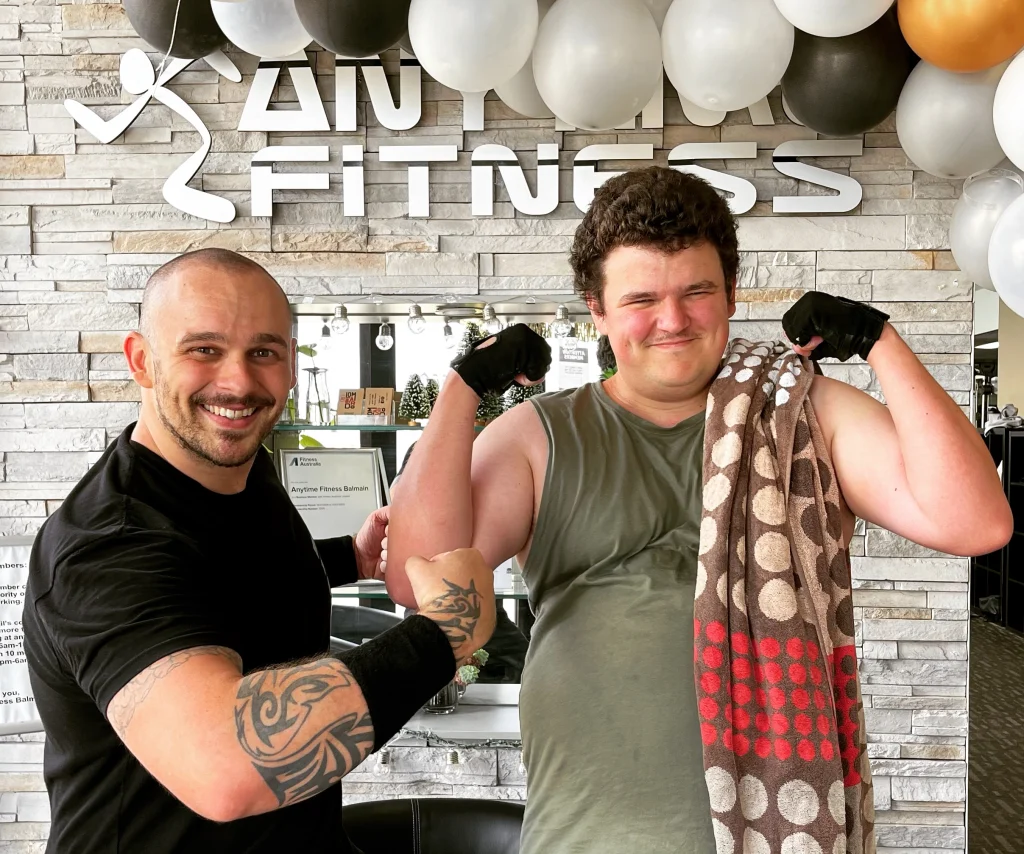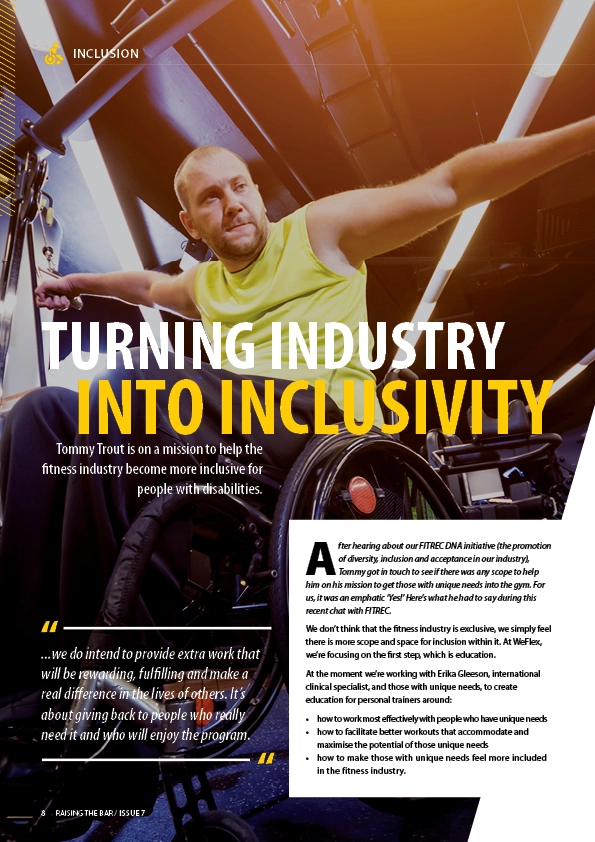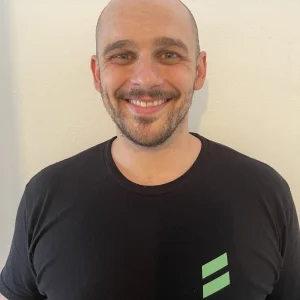INCLUSION
Turning industry into inclusivity

After hearing about our FITREC DNA initiative (the promotion of diversity, inclusion and acceptance in our industry), Tommy got in touch to see if there was any scope to help him on his mission to get those with unique needs into the gym. For us, it was an emphatic ‘Yes!’ Here’s what he had to say during this recent chat with FITREC.
We don’t think that the fitness industry is exclusive, we simply feel there is more scope and space for inclusion within it. At WeFlex, we’re focusing on the first step, which is education.
At the moment we’re working with Erika Gleeson, international clinical specialist, and those with unique needs, to create education for personal trainers around:
• how to work most effectively with people who have unique needs
• how to facilitate better workouts that accommodate and maximise the potential of those unique needs
• how to make those with unique needs feel more included in the fitness industry.
The health outcomes for people with disabilities is appalling.
Life expectancy is 20+ years less than that of the able community, and they’re three times more likely to have three or more long-term serious health issues.
They also often experience increased social isolation and exclusion.
This means that one in five Australians live shorter lives, more unhealthy lives, and more isolated lives. It is the goal of WeFlex to help reverse this trend.
It’s not about creating separate gyms for people with disabilities.
A lot of our WeFlex clients would absolutely benefit from accessing community gyms. Our intention at WeFlex is to do what we can to make this possible.
To begin with, WeFlex is running a pilot across several sites in Sydney.
For trainers with the right attitude that wish to be involved, we provide full training on how to most effectively meet the needs of people with mild to moderate intellectual disabilities.
We source and match clients to the trainer, then assist with the development of an exercise program for the trainer to coach them through, once a week, for 10 weeks.
We will ensure that personal trainers are ready, competent and confident to work with the clients provided.
We don’t see participants as being disabled, we see them as having unique needs.
The reality is, we all have unique needs and preferences as to how we want to be trained. It’s no different for those with intellectual disabilities, those in wheelchairs or with amputations or those who are vision impaired. The important thing is to ensure that Trainers have the skills required to meet those unique needs, and provide a workout experience that we all wish for.
For example, we’ll be educating personal trainers about the importance of focusing on unique sensory or communication needs, rather than simply ‘autism’ or ‘Down Syndrome’; it’s about catering to an individual’s needs, rather than focusing on the diagnosed condition.

During our pilot program, we’ll be limiting the scope of disability.
We’re aiming to get to a point where there’s not a single person we can’t train with. However, we do need to start carefully – quality of care and safety is of paramount importance. Our initial clients will have lower support needs with a diagnosis of mild to moderate intellectual disability, Autism Spectrum Disorder (ASD) or Down Syndrome.
How do we match and prepare Trainers and clients?
This process takes some time. It involves consultations with specialists, stakeholders and those with disabilities.
As an example, we have a 23-year-old male with autism. Firstly we’d discuss with him what his unique needs and goals are. Keeping in mind, an intellectual disability doesn’t mean he is physically disabled.
In this example, the unique needs are related to information-processing and/or sensory-overload. We then develop education for the trainer around accommodating these needs. In this case, we’ll highlight what they need to be mindful of, such as environmental adaptations (think music volume, and/or how crowded or noisy the gym is). We’d also provide direction on communication, ensuring it is simple and precise, as well as the importance of relying on visual information.
Ultimately, we’ll ensure trainers have the tools to better connect, build rapport and manage the personal safe space in the best way to suit the person they’re working with.
Most of these clients will be funded by the NDIS (National Disability Insurance Scheme).
As a registered NDIS provider, WeFlex will be able to handle the sourcing and billing of clients and reimburse the trainer for their set payment per session.
Benefits to personal trainers include:
• Fulfilling work with clients that rarely have the opportunity to train
• Education and professional development
• An increase in work during off-peak hours
• Guaranteed payments (including where the client is a no-show)
• No need to be registered with the NDIS (you avoid the bureaucracy that comes with it)
• Provision of additional skills and experience.
This is not a “get rich” scheme.
But we do intend to provide extra work that will be rewarding, fulfilling and make a real difference in the lives of others. It’s about giving back to people who really need it, and who will enjoy the program.
We will be particular about the personal trainers we work with.
Trainers will need to have the right attitude; they’ll need to have an inclusive mentality, be patient, and be open to new learning and experiences.
Trainers will undergo regular checks, and potentially ongoing learning.
The induction process includes a workout with one of our athletes, in front of one of our trained professionals. They’ll be looking to see how you engage and how you deliver a session. At the moment, my younger brother serves as our client in this process.
Join us, as we build a network of WeFlex-accredited gyms and Trainers.
To learn more about WeFlex and how you can get involved, contact Tommy Trout on tommy@weflex.com.au ®


Tommy Trout
Tommy Trout is on an impressive mission to improve the quality of life for people with a disability. Through his business WeFlex, Tommy is creating a platform that will connect people living with disability to fitness professionals – with an ultimate goal to build a more inclusive fitness industry.